The Booster Compressor Market is estimated to be valued at USD 1.7 billion in 2025 and is projected to reach USD 4.0 billion by 2035, registering a compound annual growth rate (CAGR) of 9.4% over the forecast period. Between 2020 and 2025, the market is expected to increase from USD 1.1 billion to USD 1.7 billion, creating an absolute dollar opportunity of USD 0.6 billion over this five-year span. Annual gains during this period range between USD 0.1 and 0.2 billion, reflecting consistent demand growth in industries such as oil and gas, manufacturing, and energy.
This initial phase is driven by infrastructure upgrades, industrial automation, and demand for high-pressure systems in emerging economies. From 2025 to 2030, the market is projected to rise from USD 1.7 billion to USD 2.8 billion, representing an absolute dollar opportunity of USD 1.1 billion. Post-2030, growth accelerates further, with the market reaching USD 4.0 billion by 2035, representing an additional USD 1.2 billion in opportunity over the next five years.
The highest annual increments are expected to occur between 2030 and 2035, with gains of USD 0.3–0.4 billion per year, signaling increased investments in energy efficiency, renewable power integration, and advanced compressor technologies. This late-cycle surge creates lucrative opportunities for players offering innovative, high-performance systems that align with stricter energy and emission standards worldwide.
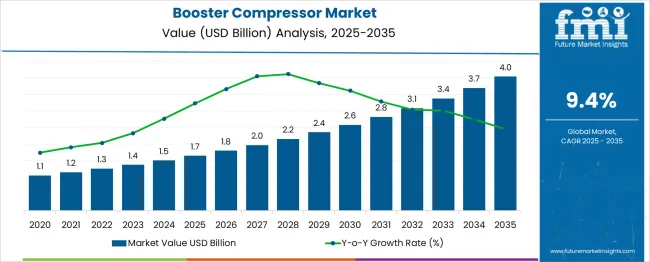
| Metric | Value |
|---|---|
| Booster Compressor Market Estimated Value in (2025 E) | USD 1.7 billion |
| Booster Compressor Market Forecast Value in (2035 F) | USD 4.0 billion |
| Forecast CAGR (2025 to 2035) | 9.4% |
The adoption of booster compressors has been driven by the need for high-pressure applications, including pressure testing, laser cutting, PET bottle manufacturing, and enhanced oil recovery. Technological advancements in compressor systems, such as energy-efficient designs and enhanced cooling mechanisms, are contributing to improved operational reliability and reduced maintenance costs.
Additionally, the integration of digital monitoring systems and smart control panels enables real-time pressure regulation, thereby enhancing overall system efficiency. Regulatory shifts toward environmentally compliant equipment and energy conservation policies are further influencing manufacturers to adopt optimized booster compressor configurations.
The future outlook remains strong as investment continues in industries that rely on high-pressure compressed air systems, particularly in emerging economies where industrial automation and energy projects are expanding. The alignment of booster compressor technologies with sustainability goals and cost-efficiency mandates is expected to drive continued market expansion.
The booster compressor market is segmented by cooling type, number of compression stages, discharge pressure, end-user, and geographic region. By cooling type, the booster compressor market is divided into Air-Cooled and Water-Cooled. In terms of compression stages, the booster compressor market is classified into Multi-Stage, Single-Stage, and Double-Stage. Based on discharge pressure, the booster compressor market is segmented into the following categories: 1500-4999 PSI, Below 999 PSI, 1000-1499 PSI, and Above 5000 PSI. The end-user market for booster compressors is segmented into Oil & Gas, Power Generation, and Industrial Others. Regionally, the booster compressor industry is classified into North America, Latin America, Western Europe, Eastern Europe, Balkan & Baltic Countries, Russia & Belarus, Central Asia, East Asia, South Asia & Pacific, and the Middle East & Africa.
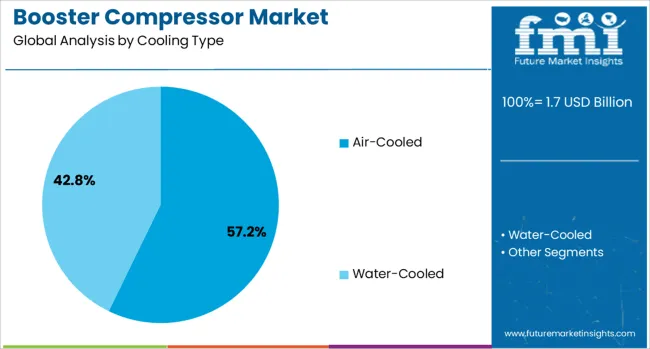
The air-cooled segment is expected to hold 57.2% of the booster compressor market revenue share in 2025, making it the most dominant cooling type. Its prominence has been influenced by the segment’s cost-effectiveness, lower maintenance requirements, and operational simplicity in a wide range of environmental conditions. Air-cooled booster compressors eliminate the need for water resources, making them suitable for installations where water availability or regulatory restrictions pose a challenge.
The segment has benefited from advancements in fan and fin technologies that enhance heat dissipation, improving the thermal efficiency of the compressor units. Air-cooled systems also offer simplified installation processes and reduced system complexity, which contributes to faster deployment and easier mobility in field-based operations.
Their increasing use in general manufacturing, automotive service centers, and light industrial applications has reinforced their position in the market. As industries continue prioritizing maintenance ease and energy efficiency, the air-cooled configuration remains a preferred choice among end users adopting booster compressors.
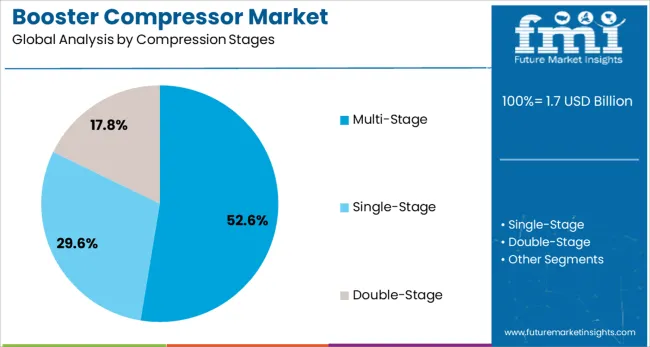
The multi-stage segment is projected to account for 52.6% of the booster compressor market revenue share in 2025, reflecting its position as the leading compression stage configuration. The dominance of this segment is attributed to its ability to efficiently handle higher compression ratios while maintaining thermal stability and operational integrity. Multi-stage booster compressors distribute the compression process across several stages, reducing the temperature rise in each stage and enhancing system efficiency.
This configuration also enables better control over final pressure output, which is essential for applications requiring consistent and precise pressure levels. Industrial sectors such as chemical processing, steel manufacturing, and aerospace have increasingly adopted multi-stage compressors for their reliability under continuous heavy-duty operation.
The segment’s growth has been further supported by innovations in stage-wise cooling, inter-stage pressure balancing, and automatic unloaders that optimize energy consumption. These technological enhancements make multi-stage systems a preferred option for facilities demanding high-performance output with long operational lifespans.
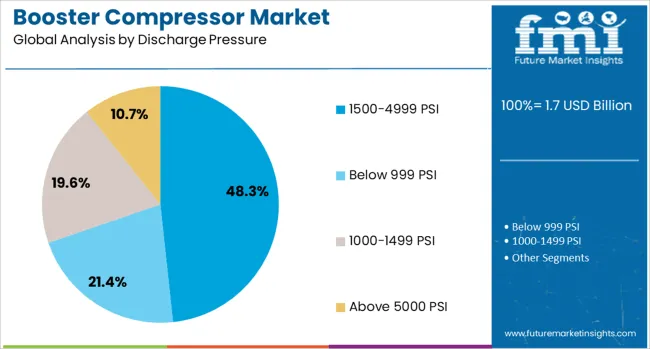
The 1500 to 4999 PSI discharge pressure segment is anticipated to capture 48.3% of the booster compressor market revenue share in 2025, highlighting its broad acceptance across critical industrial applications. This pressure range meets the operational demands of various sectors such as power generation, defense, natural gas transmission, and advanced manufacturing. The segment’s growth is being influenced by the increasing need for medium-to-high pressure air supply in tasks such as gas boosting, leak testing, and pneumatic tool operation.
Equipment operating in this pressure range offers a balance between energy efficiency and power output, making it suitable for both fixed and mobile installations. Enhanced durability and precision control mechanisms have enabled these compressors to operate reliably in demanding conditions, including offshore rigs and high-altitude facilities.
Manufacturers are increasingly designing compressors within this range to be compact and modular, facilitating integration into existing infrastructures. The consistent rise in energy and utility projects globally is expected to further reinforce the dominance of this discharge pressure segment.
The booster compressor market is expanding as industries demand higher-pressure air and gas delivery for applications in manufacturing, oil and gas, power generation, and industrial processing. These compressors enhance pressure from an existing source, enabling processes like PET bottle manufacturing, leak testing, and high-pressure cleaning. Growth is supported by infrastructure development, rising industrial automation, and the shift toward energy-efficient compressed air systems. Asia-Pacific is emerging as the fastest-growing region, while North America and Europe maintain strong replacement and upgrade markets.
Booster compressor performance depends on precise pressure ratios, airflow capacity, and compatibility with upstream compressors. Operational reliability is influenced by design quality, lubrication systems, cooling efficiency, and material durability under high-pressure conditions. Heavy-duty industrial environments require robust sealing and wear-resistant components to prevent breakdowns. Inconsistent maintenance practices can lead to premature failure, affecting production continuity. Variations in operator skill levels and adherence to maintenance schedules can further impact performance. Manufacturers offering user-friendly monitoring systems, predictive maintenance tools, and high-quality aftermarket parts are better positioned to ensure uptime. With industries increasingly valuing operational continuity, ensuring performance consistency and easy serviceability has become a key driver for market competitiveness.
Recent advancements in booster compressor technology focus on improving energy efficiency, operational control, and integration with digital monitoring platforms. Variable speed drives (VSDs) optimize energy use by adjusting motor speed to demand, reducing power consumption during low-load conditions. Advanced cooling systems extend component life, while oil-free designs cater to industries requiring contamination-free compressed air, such as food and pharmaceuticals. Remote monitoring and IoT-based diagnostics allow predictive maintenance, minimizing downtime. Innovations in piston and diaphragm designs have improved compression efficiency, reduced vibration, and enhanced service intervals. Integration with automated plant systems supports better process synchronization, enabling energy savings and productivity gains. As sustainability goals tighten, high-efficiency booster compressors are gaining traction among customers seeking to balance performance with lower environmental impact.
Booster compressors are finding wider applications across diverse sectors. In manufacturing, they are used for pneumatic tools, pressure testing, and molding operations. The oil and gas sector relies on them for pipeline pressure boosting and gas recovery. Power plants use booster compressors in gas turbine starting systems, while defense and aerospace industries employ them for high-pressure breathing air and testing systems. The beverage industry utilizes them in PET bottle production, which requires consistent high-pressure air. Emerging markets in Asia-Pacific and the Middle East are driving demand through infrastructure projects, industrialization, and growth in automotive manufacturing. The diversification of applications provides resilience against sector-specific slowdowns and encourages manufacturers to develop modular and customizable units suited for niche requirements, broadening their customer base.
The booster compressor market is influenced by evolving safety regulations, energy efficiency mandates, and emissions standards. Compliance with ISO and ASME pressure equipment codes is essential for international trade. Energy efficiency directives, particularly in Europe, are prompting manufacturers to integrate low-energy components and optimize system performance. However, high initial costs, especially for advanced models with oil-free technology and VSD integration, can limit adoption among small and medium enterprises. Fluctuations in raw material prices, such as steel and specialty alloys, add cost pressure to production. In addition, downtime due to compliance inspections or certification renewals can disrupt operations for end users. Manufacturers that can deliver cost-effective, regulation-compliant solutions while offering financing options and strong service support are more likely to succeed in competitive markets.
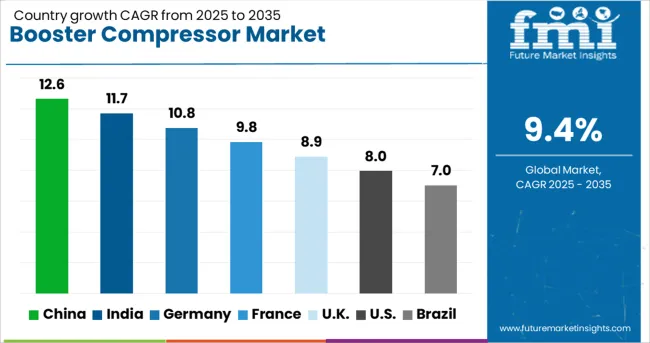
| Country | CAGR |
|---|---|
| China | 12.6% |
| India | 11.7% |
| Germany | 10.8% |
| France | 9.8% |
| UK | 8.9% |
| USA | 8.0% |
| Brazil | 7.0% |
The global booster compressor market is growing at a 9.4% CAGR, driven by rising demand in industrial operations, energy projects, and high-pressure applications. Among BRICS nations, China leads with 12.6% growth, supported by large-scale manufacturing capacity and export-oriented production. India follows at 11.7%, fueled by increasing use in oil & gas, mining, and infrastructure sectors. In the OECD region, Germany records 10.8% growth, reflecting high precision standards and strong domestic consumption. The United Kingdom grows at 8.9%, supported by industrial refurbishment projects and marine applications. The United States, a mature market, shows 8.0% growth, shaped by robust demand in energy, defense, and process industries. These countries collectively influence market dynamics through production capabilities, compliance frameworks, and end-user demand patterns. This report includes insights on 40+ countries; the top countries are shown here for reference.
China commands the booster compressor market with a strong 12.6% CAGR, fueled by rising demand in sectors such as manufacturing, petrochemicals, and energy projects. The expansion of large-scale industrial facilities drives consistent adoption of booster compressors for processes requiring high-pressure gas delivery. Compared to other regions, China benefits from large domestic production capabilities, ensuring lower costs and faster availability. The oil and gas sector remains a major consumer, with ongoing pipeline projects adding to demand. Mining and steel industries also rely heavily on high-performance compressors to maintain operational efficiency. The local market is further strengthened by the availability of multiple compressor sizes catering to varied applications, from small-scale production to heavy-duty operations. Competitive pricing from domestic manufacturers gives China a strong edge in both domestic and export markets.
India records an 11.7% CAGR in the booster compressor market, driven by expansion in manufacturing hubs and energy infrastructure. The petrochemical and natural gas sectors are key contributors to growth, supported by pipeline network developments and gas distribution projects. Compared to China, India’s growth is slightly slower but benefits from increasing investments in industrial modernization and gas processing facilities. Booster compressors are also gaining adoption in power plants for turbine operations and in the automotive sector for testing purposes. The market benefits from government initiatives promoting cleaner fuel usage, boosting the need for compressed natural gas supply chains. Local manufacturers are improving capacity to meet domestic demand and reduce reliance on imports. A growing number of service providers offering maintenance and customization is also helping end users improve operational reliability.
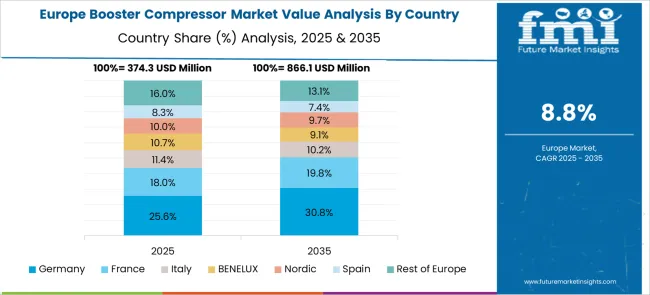
Germany maintains a 10.8% CAGR in the booster compressor market, supported by widespread use in chemical processing, energy, and industrial gas applications. The country’s manufacturing precision and strict product quality requirements make it a significant importer of high-performance compressors, despite a strong domestic engineering base. Compared to Asian markets, Germany places a greater emphasis on efficiency and reliability over cost competitiveness. The oil refining sector and compressed air systems in production lines are major demand drivers. Increasing use of hydrogen and other specialty gases in energy and industrial projects also contributes to market growth. Strategic collaborations between compressor producers and engineering firms enable customized solutions for diverse applications. Germany’s infrastructure for gas storage and distribution offers a steady customer base for booster compressor suppliers.
The United Kingdom booster compressor market advances at an 8.9% CAGR, with steady growth supported by applications in energy, manufacturing, and construction. Offshore oil and gas projects remain a major source of demand, particularly in maintaining well pressure and gas transfer. Compared to Germany, the UK market is smaller but benefits from a robust service network and steady imports of advanced compressor units. The construction industry also utilizes booster compressors in large-scale infrastructure works, particularly in tunneling and foundation drilling. Local distributors play a crucial role in ensuring timely supply and maintenance, supporting reliability for industrial operations. The market outlook is strengthened by continuous energy projects and the adaptability of booster compressors for varied pressure requirements in different industries.
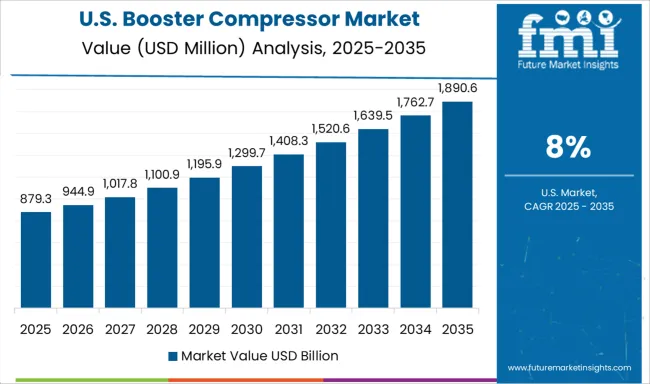
The United States booster compressor market grows at an 8.0% CAGR, propelled by oil and gas extraction, industrial gas production, and large-scale manufacturing needs. The shale gas sector is a key driver, with compressors playing a critical role in processing and transportation. Compared to the UK, the USA market benefits from higher overall demand volumes due to extensive energy sector operations. The chemical industry also contributes significantly, requiring high-pressure systems for various processing steps. The military and aerospace sectors create niche demand for specialized compressors in testing and operational environments. With a well-established network of global and domestic manufacturers, the market enjoys a diverse product supply. Continued investment in energy infrastructure and industrial expansion ensures stable demand for booster compressors across multiple applications.
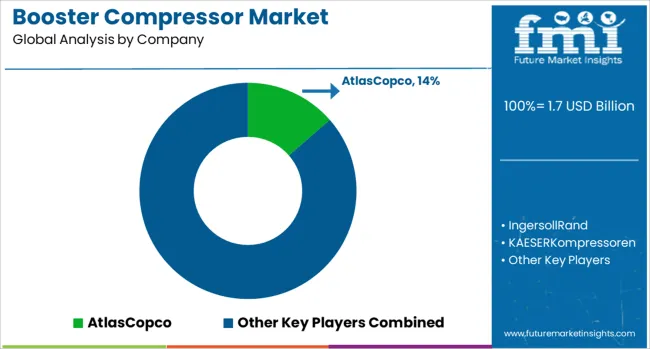
The booster compressor market is led by a concentrated set of global and regional players, with Atlas Copco, Ingersoll Rand, Siemens Energy, Elliott Group, and Howden occupying the dominant segment of market share. Atlas Copco maintains a leadership position through its integrated package solutions, which combine high-efficiency electric and gas-driven booster compressors with advanced variable-speed drives. This enables industrial users to reduce energy intensity while achieving high-pressure delivery for oil and gas, chemical, and refinery applications. Ingersoll Rand differentiates with modular rotary screw booster designs and predictive maintenance platforms, securing contracts in North America and Europe for hydrogen compression and air separation units.
Siemens Energy and Elliott Group target large-scale petrochemical and LNG applications, leveraging customized centrifugal booster designs, aerodynamic blade optimization, and hybrid-drive integration to enhance throughput and reliability, particularly in projects in the Middle East and Asia Pacific regions. Howden has carved a niche in industrial and utility-scale booster compressors, focusing on low-vibration, high-pressure air and gas handling solutions, particularly in Southeast Asia and Latin America. Regional players in India and China capture emerging market demand through compact, cost-optimized reciprocating and centrifugal booster systems. Market competition is characterized by technological differentiation, energy efficiency, project customization, and aftermarket service networks. Global leaders maintain a revenue share of over 60%, while regional specialists cater to small and medium-scale industrial installations.
| Item | Value |
|---|---|
| Quantitative Units | USD 1.7 Billion |
| Cooling Type | Air-Cooled and Water-Cooled |
| Compression Stages | Multi-Stage, Single-Stage, and Double-Stage |
| Discharge Pressure | 1500-4999 PSI, Below 999 PSI, 1000-1499 PSI, and Above 5000 PSI |
| End-User | Oil & Gas, Power Generation, Industrial, and Others |
| Regions Covered | North America, Europe, Asia-Pacific, Latin America, Middle East & Africa |
| Country Covered | United States, Canada, Germany, France, United Kingdom, China, Japan, India, Brazil, South Africa |
| Key Companies Profiled | AtlasCopco, IngersollRand, KAESERKompressoren, BauerKompressoren, SauerCompressors, GardnerDenver, BOGECompressors, SiemensAG, SulzerAG, QuincyCompressor, HertzKompressoren, KobeSteelLtd., and SullairLLC |
| Additional Attributes | Dollar sales in the Booster Compressor Market vary by type (air, gas, water-cooled), stage (single-stage, multi-stage), application (oil & gas, manufacturing, power generation, chemical processing), and region (North America, Europe, Asia-Pacific). Growth is driven by rising industrial operations, high-pressure application needs, and expansion in energy and manufacturing sectors. |
The global booster compressor market is estimated to be valued at USD 1.7 billion in 2025.
The market size for the booster compressor market is projected to reach USD 4.0 billion by 2035.
The booster compressor market is expected to grow at a 9.4% CAGR between 2025 and 2035.
The key product types in booster compressor market are air-cooled and water-cooled.
In terms of compression stages, multi-stage segment to command 52.6% share in the booster compressor market in 2025.






Full Research Suite comprises of:
Market outlook & trends analysis
Interviews & case studies
Strategic recommendations
Vendor profiles & capabilities analysis
5-year forecasts
8 regions and 60+ country-level data splits
Market segment data splits
12 months of continuous data updates
DELIVERED AS:
PDF EXCEL ONLINE
SPF Boosters Market Size and Share Forecast Outlook 2025 to 2035
Domestic Booster Pumps Market Growth - Trends, Demand & Innovations 2025 to 2035
Hydration Boosters Market – Growth, Functional Beverages & Industry Demand
Commercial Booster Pumps Market Size and Share Forecast Outlook 2025 to 2035
Air Pressure Booster System Market Growth - Trends & Forecast 2025 to 2035
Testosterone Booster Industry Analysis by Component, Source, Distribution Channels and Regions 2025 to 2035
In-wash Scent Booster Market Size and Share Forecast Outlook 2025 to 2035
High-Pressure Booster Market Growth – Trends & Forecast 2024-2034
Hyaluronic Acid Boosters Market Analysis - Size and Share Forecast Outlook 2025 to 2035
Automotive Brake Booster and Master Cylinder Market Size and Share Forecast Outlook 2025 to 2035
Automotive Vacuum Brake Booster Market Size and Share Forecast Outlook 2025 to 2035
Compressor Oil Market Size and Share Forecast Outlook 2025 to 2035
Compressor Rental Market Size, Share, and Forecast 2025 to 2035
Compressors and Vacuum Pumps Market Growth - Trends & Forecast 2025 to 2035
Compressor Control System Market
PAG Compressor Oil Market Size and Share Forecast Outlook 2025 to 2035
Air Compressor Filters and Compressed Air Dryers Market Growth - Trends & Forecast 2025 to 2035
Screw Compressor Market Size and Share Forecast Outlook 2025 to 2035
Chest Compressors Market
Thermocompressors Market

Thank you!
You will receive an email from our Business Development Manager. Please be sure to check your SPAM/JUNK folder too.
Chat With
MaRIA